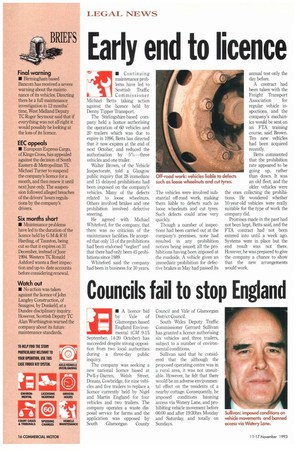Early end to licence
Page 18

If you've noticed an error in this article please click here to report it so we can fix it.
1 • Continuing maintenance problems have led to Scottish Traffic Commissioner Michael Betts taking action against the licence held by Denny Tipper Transport.
The Stirlingshire-based company held a licence authorising the operation of 60 vehicles and 20 trailers which was due to expire in 1996. Betts has directed that it now expires at the end of next October, and reduced the authorisation by 5%—three vehicles and one trailer.
Walter Brown, of the Vehicle Inspectorate, told a Glasgow public inquiry that 28 immediate and 15 delayed prohibitions had been imposed on the company's vehicles. Many of the defects related to loose wheelnuts. Others involved brakes and one prohibition involved defective steering.
He agreed with Michael Whiteford, for the company, that there was no criticism of the maintenance facilities. He accepted that only 15 of the prohibitions had been endorsed "neglect" and that there had only been 45 prohibitions since 1989.
Whiteford said the company had been in business for 30 years. The vehicles were involved substantial off-road work, making them liable to defects such as loose wheelnuts and cut tyres. Such defects could arise very quickly.
Though a number of inspections had been carried out at the company's premises, none had resulted in any prohibition notices being issued; all the prohibitions having been imposed at the roadside. A vehicle given an immediate prohibition for defective brakes in May had passed its
annual test only the day before.
A contract had been taken with the Freight Transport Association for regular vehicle inspections, and the company's mechanics would be sent on an FTA training course, said Brown. Ten new vehicles had been acquired recently.
Betts commented that the prohibition rate appeared to be going up, rather than down. It was an old fleet, and the older vehicles were the ones collecting the prohibitions. He wondered whether 10-year-old vehicles were really suitable for the type of work the company did.
Promises made in the past had not been kept, Betts said, and the FTA contract had not been entered into until a week ago. Systems were in place but the end result was not there. However, he was prepared to give the company a chance to show that the new arrangements would work.




















































































